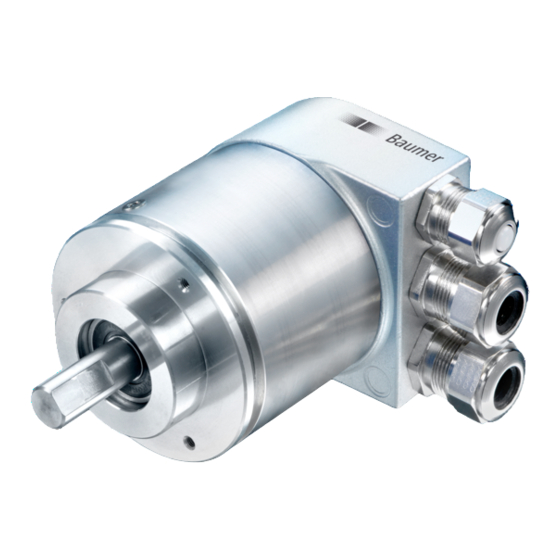Baumer GBMMS Manuel - Page 7
Parcourez en ligne ou téléchargez le pdf Manuel pour {nom_de_la_catégorie} Baumer GBMMS. Baumer GBMMS 24 pages. Absolute encoder with powerlink interface
Également pour Baumer GBMMS : Manuel (41 pages), Manuel (19 pages), Manuel (26 pages), Manuel (19 pages)

4. Commissioning
4.1. Mechanical mounting
Shaft encoders
• Mount the encoder by help of the mounting holes and three screws (square flange: 4 screws) provided at
the encoder flange. Observe thread diameter and depth.
• There is an alternative mounting option in any angular position by eccentric fixings, see under
accessories.
• Connect drive shaft and encoder shaft by using an appropriate coupling. The shaft ends must not touch
each other. The coupling must compensate temperature and mechanical tolerances. Observe the
maximum permitted axial or radial shaft load. For appropriate couplings please refer to accessories.
• Tighten the mounting screws firmly.
End shaft/hollow shaft encoders
• Mounting by clamping ring
Prior to mounting the encoder open the clamping ring completely. Push encoder onto the drive shaft and
tighten the clamping ring firmly.
• Adjusting element with rubber buffer
Push the encoder onto the drive shaft and insert the cylindrical pin into the adjusting element (customer-
mounted) and the rubber buffer.
• Mounting angle
Push the encoder onto the drive shaft. Insert adjusting angle into the encoder's rubber buffer and fasten
the mounting angle at the contact surface.
• Stud screw
Push the encoder onto the drive shaft and insert the stud screw (customer-mounted) into the encoder's
rubber buffer.
• Spring washer
Fasten the spring washer at the mounting holes of the encoder housing using screws. Push the encoder
onto the drive shaft and mount the spring washer to the contact surface.
4.2. Electrical connection
Ever store and transport the bus cover in the ESD bag only.
For electrical connection remove the bus cover as follows:
•
Release the fastening screws of the bus cover
•
Carefully loosen the bus cover and lift off in an axial direction
4.2.1.
Cabling
PROFINET utilizes Fast Ethernet cable (100MBit, Cat 5) composed of four wires AWG22 (white, yellow, blue
and orange).
There are three types of PROFINET cables:
•
Type A – for fix or rigid cabling
•
Type B – for occasional movements or vibrations (flexible)
•
Type C – for permanent movements (highly flexible).
Manual_PROFINET_EN.doc
17.10.11
7/24
www.baumer.com
